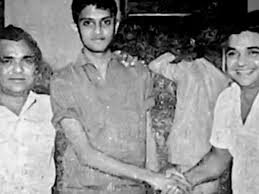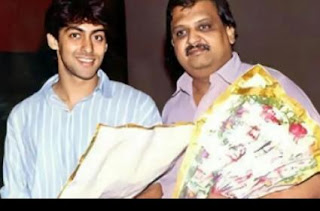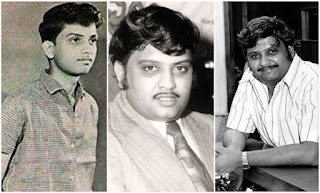PART 3 OF 10: COLLABING WITH THE RAJA
I don't believe in this business of time, timing, and planetary positions for events. But my colleague who was a fervid follower of horoscopes used to say, with his fingers postured in reverse chin mudra that "Every event and success is preordained by celestial powers and clinically timed based on positions of planets and stars."
Maybe he had a point. There was no doubt Balu was immensely talented. But I can't deny that his entry into the film industry was timed with atomic clock precision. TM Sounderrajan (TMS) was falling out of favor with MGR and Sivaji Ganesan in Tamil. He was getting old anyways, and he only made matters worse by rubbing them both on the wrong side by taking credit for their success.
Ghantasala who had dominated the Telugu music scene as a playback and as a music director was fading away due to ill-health. Kannada filmdom was looking for a multi-faceted voice for its gaggle of new heroes – Vishnuvardhan, Ambareesh, Srinath, Anant Nag, Shankar Nag.
SPB's dulcet voice filled the southern aural void like the early morning tropical sun filled a room with French windows, my friend (my hat-tip to Sidhu).
In the early 70s, within a few years of his Tamil debut, he had a memorable meeting with a group of musicians that would change his life forever. A newly acquired friend of his, a certain Chinnasamy (who would eventually change his name to Bharathi Raja), a drama actor and an assistant to famed Kannada film director, Puttanna Kanagal, introduced him to a certain other Raasiah, and his brothers, Baskar and Amar Singh. The brothers had come over to Madras from the Deep South in the hope of establishing themselves as musicians. What wouldn't I have given to be a fly on the wall to witness that epochal meeting? What did Balu think of the bright-eyed, socially awkward Raasiah? Thankfully (for you), I don't have to use my fertile imagination to recreate the happenings, like I did in a previous chapter. Balu has captured that momentous occasion in his own words, in several interviews.
Chinnasamy asked if Balu could induct the brothers into his skeletal, part-time music band that he had formed with his friend, Aniruddha.
"What do you play?" Balu asked the reticent Raasiah.
"I play the harmonium," he mumbled. Balu asked him to play something on his harmonium. We all judge people by their looks and origins, and I am sure Balu, in spite of being a fair-minded tyke, was no exception. He was perhaps expecting the famished, ebony-skinned, Pannaipuram-native to belt out a rustic folk tune. So, imagine his surprise when the musically illiterate Raasiah played the Lara's theme from the David Lean classic 'Doctor Zhivago', both-handed, on the harmonium. Balu was stunned. Who is this guy? he must have thought. Balu was in a fix. He already had a harmonium player in Aniruddha. But he was determined not to let go of this interesting talent.
"Do you play anything else?" Balu asked.
"Yes, sir. I play the guitar," he said. What? Hadn't he just said that he had not formally learned music? Balu made Raasiah the guitar player in his band and gradually, as his friend Aniruddha took a permanent job and moved away, Raasiah and his brothers established a full-fledged band with Balu and named it, "Pavalar Brothers".
The Pavalars toured the country far and wide, from "Calcutta to Kanyakumari" (Balu said in interviews), esp. where the Tamil and Telugu diaspora lived, to do over a thousand stage shows. In fact, at the time of his death, Balu had done well over ten thousand live shows. He was not just an accomplished playback singer but a fantastic performer. His improvisations and the lively interactions with his audience during his stage shows were a treat to watch.
By 1976, Balu was a renown name in the singing world of Madras, having sung hundreds of songs in the four south Indian languages.
In the middle of Indira Gandhi's state emergency that curtailed civil liberties and incarcerated thousands of Indians, Balu's dear friend, Raasiah, debuted, in 1976, as a music director - and changed his name to Ilaiyaraja. For the next two decades, there emerged, between Balu and Ilaiyaraja, one of the greatest collaborations ever in Indian music. The two recorded over two thousand songs together, with perhaps over a thousand of them turning out to be bumper hits that captured the imagination of the Tamil, Malayalam, Telugu, and
Kannada nations.
Looking back at those years, it is tough to imagine SPB and Ilaiyaraja without each other. Either would have carved their niche independently (like they did ever so often when they had these minor squabbles), but I am not sure if their music would have been as unforgettable as they are today. The one fed off the other's creative energy and talent. Balu was absolutely convinced about that. Ilaiyaraja, less so.
The featured song is from a movie that released in 1979 named 'Nenjathai killathe'. Suhasini Maniratnam, wife of renown director Mani Ratnam and niece of Kamal Haasan, made her debut in this movie.
I selected this song for several reasons. The tune is as exquisite as it is understated. It sounds as fresh to me today as it did the first time I heard it on Vividh Bharati, as a seven-year old. SPB's and Janaki's "early morning" voices show how mind-bogglingly talented they were singing this deceptively difficult tune with such effortlessness. The lyrics penned by Panchu Arunachalam are beautiful. But the clincher for me is the sensibility of the video. The movie was directed by the underrated genius J. Mahendran, who was one of the the first directors in the South that understood the medium of cinema, which was till then firmly rooted in a theatrical tradition. Much of Ilaiyaraja's music has stood the test of time brilliantly, but often unwatchable on screen. I don't think movie directors understood how to shoot songs till Mani Ratnam made it a mainstream art form. Mani's inspiration, by his own admission, was Mahendran. And you can see why, when you watch this song.




Comments
Post a Comment